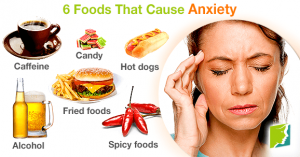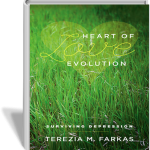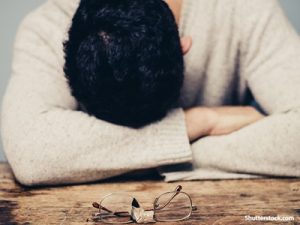Being anxious is a good thing when it motivates you, like being on time, or when it warns you of danger. But constant anxiety is not healthy. Anxiety disorders are mental illnesses. Certain foods can add to or affect anxiety. Avoid these foods when anxious:
Foods to avoid:
Caffeine
Caffeine is a stimulant and psychoactive drug. That means you get a “flight or flee” feeling when drinking coffee. If you’re anxious, that morning cup of coffee isn’t going to calm you down. It might just make you more anxious, which can lead to feeling nauseous, light-headed, and jittery. Avoid coffee before you go to sleep. Otherwise, the caffeine will keep you up at night, adding to your anxiety induced restless sleep.
Artificial and refined sugars.
Candy and pastries are high in artificial and refined sugars. Refined sugar has little nutritional value. It does, however, give you a quick energy boost because it raises your carbohydrate levels. So, while you feel good for the moment, after that moment you’ll have an energy crash. That’s bad if you’re anxious, cause you’ll fall from an emotional high to an emotional low. Plus, refined sugars rev up your anxiety. You’ll feel like you’re bouncing off the walls with excitement and energy.
Spicy foods
Spicy foods can cause heartburn and indigestion. When you’re stomach and intestines aren’t doing well, it doesn’t matter what mood you’re in. If you’re the type of person prone to anxiety, you probably won’t want to eat anything spicy because you are already thinking of how it will affect your body. You foresee the consequences and don’t want to potentially be embarrassed in public. So, the simple solution is to avoid that spicy taco.
Gluten
Unless you suffer from gluten intolerance or Celiac disease, you might not be affected by this. But if you are gluten intolerant, you have high anxiety about the food you eat. My friend always checks the ingredient labels and when eating in a restaurant, has to make sure that the food is gluten-free and there’s no cross contamination with wheat, barley, or rye products. Cross contamination is one of biggest causes of anxiety and fear among Celiac and gluten intolerant sufferers, because even a trace amount of gluten can have massive reaction.
Processed foods
Processed foods really do go through a lot of processing. Sometimes you can’t even recognize the ingredients. Like spam or hot dogs, where the meat is taken from all parts of the animal, ground together, and repacked into some form of consumable product. My motto is, if you can’t recognize the animal or plant your food is supposed to have come from, it’s probably full of chemicals and not good for you. Generally, processed foods are high in preservatives (similar to the same stuff that keeps corpses looking good), and a bunch of chemical additives that usually aren’t good for you. In fact, some of those chemicals can create anxiety and paranoia.
Alcohol
Excessive alcohol isn’t good. Alcohol impairs how much serotonin your brain produces. Serotonin is the feel good hormone. It’s also involved in normal body functions, like eating and sleeping. When you drink too much alcohol, greater amounts of serotonin starts interfering with sleep patterns and eating. Your blood sugar is lower, and you are dehydrated. But at the same time you feel good. If you try to stop drinking, you feel agitated, anxious, and depressed. To stop feeling anxious, you drink alcohol, but each time you need to drink a bit more to keep the anxiety away. That leads to alcohol dependence.
Dairy
Milk is good for your bones and body. But dairy is also inflammatory to your body. Your gut actually gets inflamed when you drink milk or eat cheese. Research has shown that anxious people who drink milk have an increase in anxiety symptoms within minutes of drinking milk. Dairy has a protein called casein. Casien has been linked to depression, anger, anxiety, and addiction. Casien takes a long time to be digested and so it stays in your system for a while. People who are sensitive to dairy products like milk, cheese, and yogurt can have brain fog after consuming those products. It’s a sensitivity, not necessarily lactose allergy or intolerance.
If you are prone to anxiety, you need to look at your diet and see if there’s anything you need to change in your eating habits. Try to eat a healthy, balanced diet. Avoid foods, especially processed foods, that can increase anxiety. Read food labels, and become familiar with what is added to certain foods. Don’t be afraid to ask your waiter or cook in a restaurant what ingredients go into the meal. After all, it’s your body and your emotional well-being.
Find me on twitter @tereziafarkas



